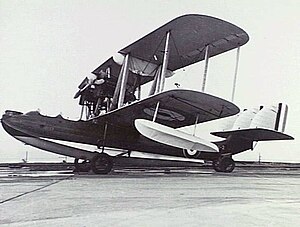Seaplane Squadron RAAF
| Seaplane Squadron RAAF | |
|---|---|

Supermarine Southampton at RAAF Point Cook in 1939
|
|
| Active | 1928–39 |
| Country | Australia |
| Branch | Royal Australian Air Force |
| Role | Seaplane training/reconnaissance |
| Part of | No. 1 Flying Training School |
| Headquarters | RAAF Point Cook |
| Commanders | |
| Notable commanders |
Bill Garing (1937, 1938) |
| Aircraft flown | |
| Patrol | Supermarine Southampton |
Seaplane Squadron was a flying unit of the Royal Australian Air Force (RAAF) between the wars. It operated Supermarine Southampton flying boats from January 1928, as well as other types. Along with Fighter Squadron, Seaplane Squadron was a component of No. 1 Flying Training School, based at RAAF Point Cook, Victoria. Seaplane Squadron was responsible for coastal reconnaissance, training aircrew to operate seaplanes, and supporting the Royal Australian Navy. It also conducted survey flights over remote parts of Australia and mapped the Darwin–Sydney section of the Empire Air Mail Scheme route. Seaplane Squadron was disbanded in June 1939.
Although the first entry in Seaplane Squadron records is dated 16 February 1934, the official history of the Royal Australian Air Force (RAAF) between the wars refers to the unit as having been in operation when Australia acquired two Supermarine Southampton flying boats, which entered service in January 1928. The Southamptons formed a coastal reconnaissance flight within Seaplane Squadron, which also operated other aircraft for seaplane training. Seaplane Squadron was one of two formations raised at RAAF Point Cook, Victoria, under the auspices of No. 1 Flying Training School (No. 1 FTS), the other being Fighter Squadron, which operated Bristol Bulldogs. No. 1 FTS had been the first unit to be formed as part of the new Australian Air Force on 31 March 1921 (the prefix "Royal" was added in August that year).
The Southamptons (nicknamed "Swamptons") were the biggest aircraft in the RAAF's inventory at the time and a new seaplane hangar was specially constructed for them at Point Cook. On 22 June, one of the flying boats was overturned by strong wind on the Torrens River en route to meet the four Southamptons of the Royal Air Force's Far East Flight near Adelaide. In their naval cooperation role, the Southamptons were required to locate and shadow "enemy" cruisers on exercises. They also trialled radio communications between aircraft and naval ships.
...
Wikipedia
